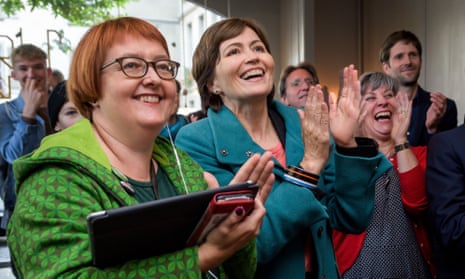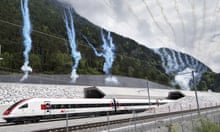Green parties have made historic gains in national elections in Switzerland, marking a significant shift in power in the consensus-centred system of the Alpine country, where political change often takes place at glacial speed.
The rightwing anti-immigrant Swiss People’s party (SVP) remained the largest party in parliament despite a slip in its support. But the Swiss Greens received a six-point bump on their 2015 performance, taking 13.2% of the vote in a result that amounted to “a tectonic shift”, according to their president, Regula Rytz.
Boosted by a campaign in which concerns about climate change took centre stage, Rytz called for the “urgent convening of a national climate summit”.
In an interview published by Swiss newspaper Neue Zuercher Zeitung on Monday, she also raised the role of the country’s financial sector in the climate emergency. “We have to hold the financial centre more accountable,” she said. “Do not invest any longer in coal or fossil energy. Renewable energies are the opportunity for the future.”
The Green Liberals – an environmentalist party with a pro-business stance that split from the Greens in 2004 – also gained ground, taking 7.8% of the vote compared with less than 5% in 2015.
“It’s more than a wave, it’s a tidal wave on the Swiss scale,” the political scientist Pascal Sciarini told AFP.
The focus in the coming weeks will turn to whether the Greens – or a coalition of the two parties – will claim one of the seven seats in the national cabinet, which has been made up of members of the same four main parties for the last 60 years.
Under the so-called “magic formula” for power sharing, six cabinet seats are shared equally by the SVP, the Social Democratic party (SP) and the right-leaning liberal FDP, with the centrist Christian Democrats holding the seventh seat.
The presidency rotates each year, and the number of seats held by the parties is usually only adjusted if electoral trends have held up over two elections in a row.
The influential broadsheet Neue Zürcher Zeitung said the result had called the magic formula into question, but also warned against upsetting the country’s balance of power. “It is a wise tradition that parties have to prove their strength over a certain period,” the paper said.
Under Switzerland’s unique political system, the election decides the 200 lower house lawmakers and 46 senators elected to four-year terms, but the makeup of the executive Federal Council will not be decided until December.
The SVP claimed 25.6% of the vote, down from the 29.4% it garnered in 2015. The rightwing conservative party has in past years built its strength on warning about immigration and condemning the influence of the EU, of which Switzerland is not a member.
In its election posters, the SVP pledged to protect Swiss citizens from three angry aggressors: a Middle-Eastern looking man with a beard, a bespectacled man in a jumper bearing the stars of the EU flag, and a girl wearing her hair in the distinctive style of Greta Thunberg’s braids.
But the SVP’s tried and tested messages failed to cut through, with the party facing a larger-than-expected loss of 3.8 percentage points.
The University of Lausanne political scientist Oscar Mazzoleni told AFP the results showed that the SVP struggled to attract young voters while its ageing electoral base was less motivated to vote than in 2015, when Europe’s refugee crisis was on “page one”.
The SVP is also the only major party that has not pledged to pursue bolder climate action, having consistently denounced “climate hysteria” in Swiss politics.
The three other parties in the cabinet, the SP, the FDP and the Christian Democrats, also chalked up significant losses, with the latter party being beaten to fourth spot by the Greens for the first time.
Yet it remains clear how Swiss consensus politics will allow for the Greens to claim their place. Removing the Christian Democrats, who have served in cabinet since the formula was implemented in 1959 and represent Switzerland’s centrist bloc, would mark a break with national tradition.
The leftwing Greens would rather take a Federal Council seat from the right-leaning FDP, but may have to form a tricky alliance with the Green Liberals to do so.
But Rytz has made clear she believes the Greens belong in government. “Now is the time,” she said, adding that Swiss leaders “may need to discuss a new magic formula” to reflect changing political priorities.
The results provided further evidence that a nation whose economy and lifestyle are closely tied to the country’s stunning snow-capped peaks has grown increasingly concerned about the ravages of climate change.
A recent study by ETH Zurich university found that more than 90% of 4,000 glaciers dotted throughout the Alps could disappear by 2100 if greenhouse gas emissions are not curbed.
Associated Press contributed to this report










